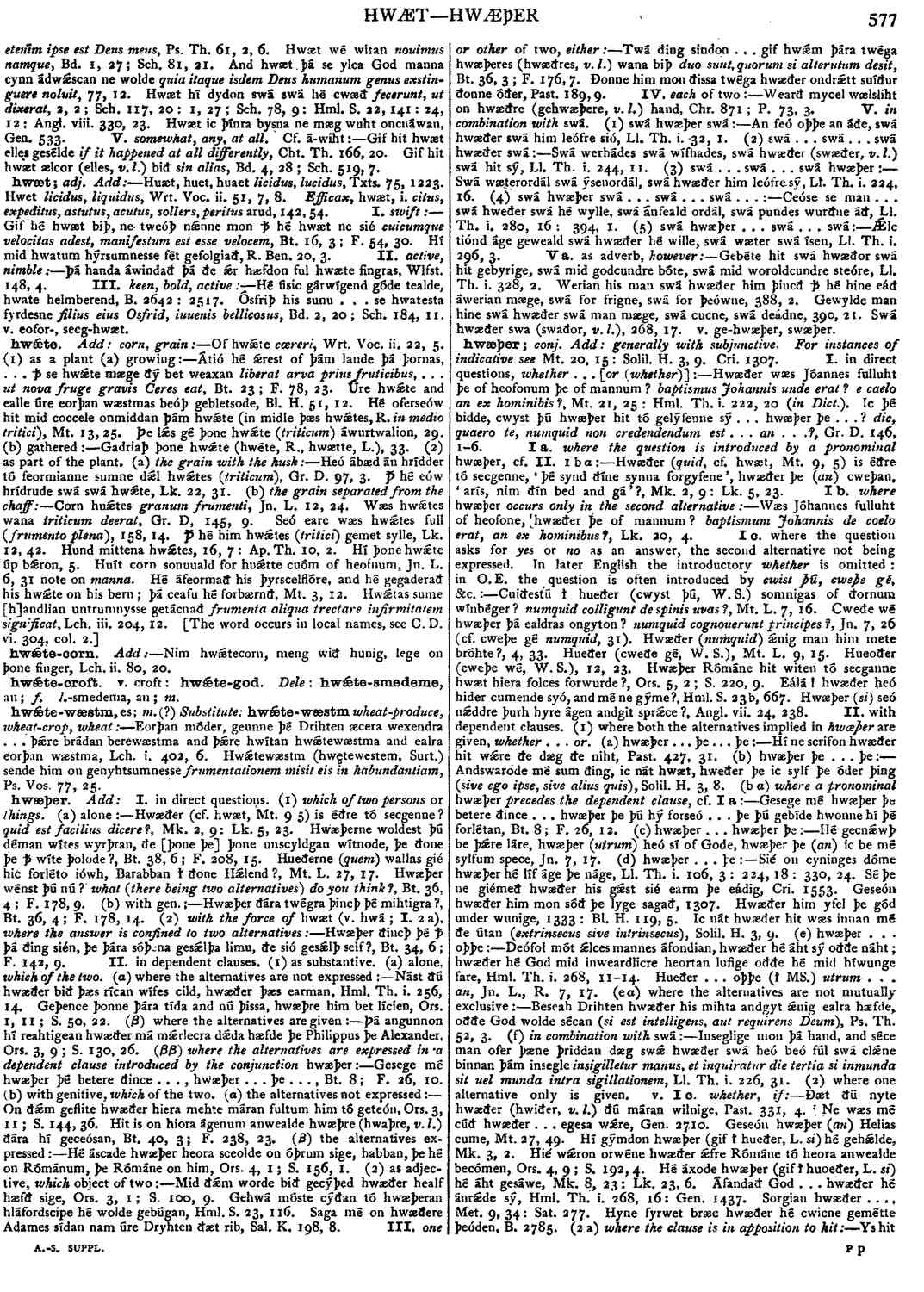hwæþer
-
Hwæðer (cf. hwæt, Mt. 9, 5) is éðre tó secgenne?
quid est facilius dicere?,
- Mk. 2, 9: Lk. 5, 23.
-
Hwæþerne woldest þú déman wítes wyrþran, ðe [þone þe] þone unscyldgan wítnode, þe ðone þe ꝥ wíte þolode?,
- Bt. 38, 6; F. 208, 15.
-
Hueðerne (
quem
) wallas gié hic forléto iówh, Barabban ł ðone- Hǽlend?, Mt. L. 27, 17.
-
Hwæþer wénst þú nú?
what (there being two alternatives) do you think?,
- Bt. 36, 4; F. 178, 9.
-
Hwæþer ðára twégra þincþ þé mihtigra?,
- Bt. 36, 4; F. 178, 14.
-
Hwæþer ðincþ þé ꝥ þá ðing sién, þe þára sóþena gesǽlþa limu, ðe sió gesǽlþ self?,
- Bt. 34, 6; F. 142, 9.
-
Nást ðú hwæðer bið þæs rícan wífes cild, hwæðer þæs earman,
- Hml. Th. i. 256, 14.
-
Geþence þonne þára tída and nú þissa, hwæþre him bet lícien,
- Ors. 1, 11; S. 50, 22.
-
Þá angunnon hí reahtigean hwæðer má mǽrlecra dǽda hæfde þe Philippus þe Alexander, Ors. 3, 9; S. 130, 26. (ββ)
where the alternatives are expressed in a dependent clause introduced by the conjunction
hwæþer :-- Gesege mé hwæþer þé betere ðince ..., hwæþer ... þe ...,- Bt. 8; F. 26, 10.
-
On ðǽm geflite hwæðer hiera mehte máran fultum him tó geteón,
- Ors. 3, 11; S. 144, 36.
-
Hit is on hiora ágenum anwealde hwæþre (hwaþre,
v. l.
) ðára hí geceósan,- Bt. 40, 3; F. 238, 23.
-
Hé áscade hwæþer heora sceolde on óþrum sige, habban, þe hé on Rómánum, þe Rómáne on him,
- Ors. 4, 1; S. 156, 1.
-
Mid ðǽm worde bið gecýþed hwæðer healf hæfð sige,
- Ors. 3, 1; S. 100, 9.
-
Gehwá móste cýðan tó hwæþeran hláfordscipe hé wolde gebúgan,
- Hml. S. 23, 116.
-
Saga mé on hwæðere Adames sídan nam úre Dryhten ðæt rib,
- Sal. K. 198, 8.
-
Twá ðing sindon ... gif hwǽm þára twéga hwæþeres (hwæðres, v. l.) wana biþ
duo sunt, quorum si alterutum desit,
- Bt. 36, 3; F. 176, 7.
-
Ðonne him mon ðissa twéga hwæðer ondrǽtt suíður ðonne óðer,
- Past. 189, 9.
-
Wearð mycel wælsliht on hwæðre (gehwæþere,
v. l.
) hand,- Chr. 871; P. 73, 3.
-
An feó oþþe an áðe, swá hwæðer swá him leófre sió,
- Ll. Th. i. 32, 1.
-
Swá werhádes swá wífhades, swá hwæðer (swæðer,
v. l.
) swá hit sý,- Ll. Th. i. 244, 11.
-
Swá wæterordál swá ýsenordál, swá hwæðer him leófre sý,
- Ll. Th. i. 224, 16.
-
Ceóse se man ... swá hweðer swá hé wylle, swá ánfeald ordál, swá pundes wurðne áð,
- Ll. Th. i. 280, 16: 394, 1.
-
Ǽlc tiónd áge geweald swá hwæðer hé wille, swá wæter swá ísen, Ll. Th. i. 296, 3. V a. as adverb,
however
:-- Gebéte hit swá hwæðor swá hit gebyrige, swá mid godcundre bóte, swá mid woroldcundre steóre,- Ll. Th. i. 328, 2.
-
Werian his man swá hwæðer him þincð ꝥ hé hine eáð áwerian mæge, swá for frigne, swá for þeówne,
- 388, 2.
-
Gewylde man hine swá hwæðer swá man mæge, swá cucne, swá deádne,
- 390, 21.
-
Swá hwæðer swá (swaðor,
v. l.
),- 268, 17.
Bosworth, Joseph. “hwæþer.” In An Anglo-Saxon Dictionary Online, edited by Thomas Northcote Toller, Christ Sean, and Ondřej Tichy. Prague: Faculty of Arts, Charles University, 2014. https://bosworthtoller.com/53472.
Checked: 0